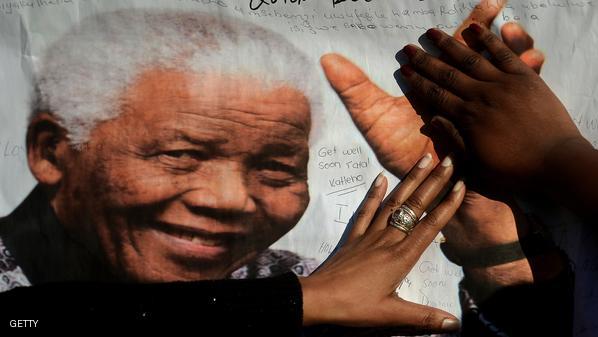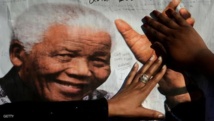"It means a big loss for the country and we will really miss him. I miss him myself personally but always I will have him in my mind."
Brand arrived on Robben Island in the late 1970s as a politically naive 18-year-old, whose first impression of the "terrorists" inside was that they were friendly, polite, neatly turned out -- and old.
But the brutal violence of the era meant he felt an immediate aversion to them, until Mandela spurred an extraordinary transformation.
"The change came while I was working on Robben Island with him," Brand told AFP, saying he grew up on the island.
The understanding of what Mandela and his comrades were fighting for came to him along with lessons in being humble, pride in oneself, and the importance of studying hard and always being helpful.
"He said the more you give away, the more you will get," said Brand, explaining that Mandela gave him advice and helped him.
Brand was also privy to the torment and deprivation that prisoners felt, such as being cut off from loved ones.
This led to rules being bent such as when Mandela's ex-wife Winnie Madikizela-Mandela smuggled in their baby granddaughter Zaziwe.
She had shielded the tiny girl from the rain under a blanket as she travelled on the ferry from the mainland, relegated to the top deck as blacks were not allowed inside the boat.
At the time, Mandela was only allowed one visit every three months for 30 minutes. He spoke to the visitor through a small glass window.
Children were not allowed in, but once he knew she was there, he asked to see his grandchild.
"Immediately he looked to me and asked, Mr Brand is it just possible to see the child from a distance. My answer was 'no'," said Brand, knowing that the visits were bugged.
But telling Madikizela-Mandela that he had never held a black child, Brand took the baby and allowed a teary Mandela to kiss and hold his grandchild.
It was a secret that Mandela kept until he became South Africa's first black president, when he told parliament how his granddaughter had been smuggled in.
"My relation was prison warder to prisoner but after the 80s we changed," said Brand.
'A very pleasant young man'
After Mandela was moved to Pollsmoor prison in Cape Town in 1982, a drama over a desired type of hairdressing lotion erupted and Brand -- who had been transferred to that jail -- was ordered to find some for Mandela, eventually tracking it down in a pharmacy.
He also took Mandela to meet his family at his flat in town.
"From then on, I sent his children Christmas cards every year," said Mandela about the occasion, describing Brand as "a very pleasant young man".
He was the first person to congratulate Brand on a promotion, helped his son get a scholarship and contacted Brand after the same son died in a car accident.
Mandela was revered for his ability to forgive his jailers and even kept in touch over the years with the guards he had connected with during his imprisonment.
"Men like... Warrant Officer Brand reinforced my belief in the essential humanity even of those who had kept me behind bars for the previous twenty-seven and a half years," he once remarked.
Mandela, Brand said, did not change after becoming president and he was still the same person that "always let you feel the big person".
He was someone who would go "the extra mile for anybody".
Brand has returned to work on Robben Island, which is now a museum.
Mandela's death on Thursday aged 95 was a shock but also expected as he had been in poor health at the end.
"People will always remember Mandela for the humble, down-to-earth person, the person who leads the country, who changed the country without bloodshed, you know that will also be in the people's minds," said Brand.
"For me it feels (like) I lost a father even if he was my prisoner."
------------------------------------------------------------------------------------------------------------
Brand arrived on Robben Island in the late 1970s as a politically naive 18-year-old, whose first impression of the "terrorists" inside was that they were friendly, polite, neatly turned out -- and old.
But the brutal violence of the era meant he felt an immediate aversion to them, until Mandela spurred an extraordinary transformation.
"The change came while I was working on Robben Island with him," Brand told AFP, saying he grew up on the island.
The understanding of what Mandela and his comrades were fighting for came to him along with lessons in being humble, pride in oneself, and the importance of studying hard and always being helpful.
"He said the more you give away, the more you will get," said Brand, explaining that Mandela gave him advice and helped him.
Brand was also privy to the torment and deprivation that prisoners felt, such as being cut off from loved ones.
This led to rules being bent such as when Mandela's ex-wife Winnie Madikizela-Mandela smuggled in their baby granddaughter Zaziwe.
She had shielded the tiny girl from the rain under a blanket as she travelled on the ferry from the mainland, relegated to the top deck as blacks were not allowed inside the boat.
At the time, Mandela was only allowed one visit every three months for 30 minutes. He spoke to the visitor through a small glass window.
Children were not allowed in, but once he knew she was there, he asked to see his grandchild.
"Immediately he looked to me and asked, Mr Brand is it just possible to see the child from a distance. My answer was 'no'," said Brand, knowing that the visits were bugged.
But telling Madikizela-Mandela that he had never held a black child, Brand took the baby and allowed a teary Mandela to kiss and hold his grandchild.
It was a secret that Mandela kept until he became South Africa's first black president, when he told parliament how his granddaughter had been smuggled in.
"My relation was prison warder to prisoner but after the 80s we changed," said Brand.
'A very pleasant young man'
After Mandela was moved to Pollsmoor prison in Cape Town in 1982, a drama over a desired type of hairdressing lotion erupted and Brand -- who had been transferred to that jail -- was ordered to find some for Mandela, eventually tracking it down in a pharmacy.
He also took Mandela to meet his family at his flat in town.
"From then on, I sent his children Christmas cards every year," said Mandela about the occasion, describing Brand as "a very pleasant young man".
He was the first person to congratulate Brand on a promotion, helped his son get a scholarship and contacted Brand after the same son died in a car accident.
Mandela was revered for his ability to forgive his jailers and even kept in touch over the years with the guards he had connected with during his imprisonment.
"Men like... Warrant Officer Brand reinforced my belief in the essential humanity even of those who had kept me behind bars for the previous twenty-seven and a half years," he once remarked.
Mandela, Brand said, did not change after becoming president and he was still the same person that "always let you feel the big person".
He was someone who would go "the extra mile for anybody".
Brand has returned to work on Robben Island, which is now a museum.
Mandela's death on Thursday aged 95 was a shock but also expected as he had been in poor health at the end.
"People will always remember Mandela for the humble, down-to-earth person, the person who leads the country, who changed the country without bloodshed, you know that will also be in the people's minds," said Brand.
"For me it feels (like) I lost a father even if he was my prisoner."
------------------------------------------------------------------------------------------------------------









 Home
Home Politics
Politics











